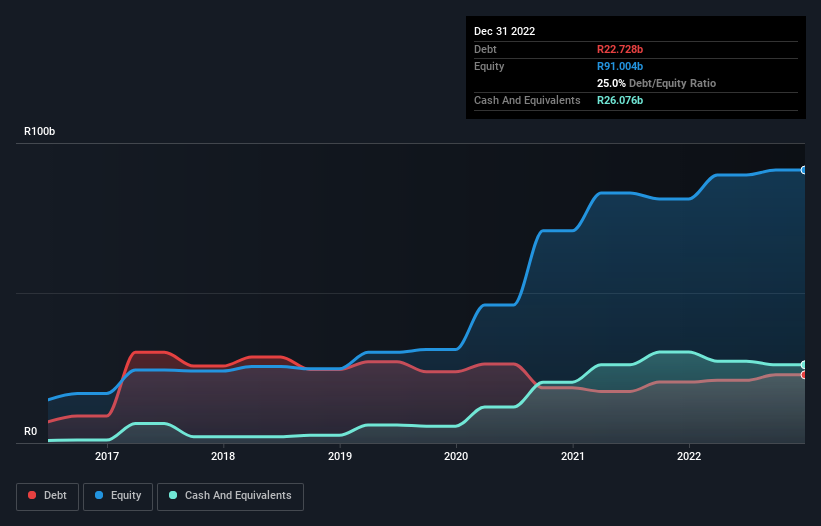
Some say volatility, rather than debt, is the best way to think about risk as an investor, but Warren Buffett famously said that 'Volatility is far from synonymous with risk.' It's only natural to consider a company's balance sheet when you examine how risky it is, since debt is often involved when a business collapses. We can see that Sibanye Stillwater Limited (JSE:SSW) does use debt in its business. But should shareholders be worried about its use of debt?
When Is Debt Dangerous?
Debt is a tool to help businesses grow, but if a business is incapable of paying off its lenders, then it exists at their mercy. Part and parcel of capitalism is the process of 'creative destruction' where failed businesses are mercilessly liquidated by their bankers. However, a more frequent (but still costly) occurrence is where a company must issue shares at bargain-basement prices, permanently diluting shareholders, just to shore up its balance sheet. By replacing dilution, though, debt can be an extremely good tool for businesses that need capital to invest in growth at high rates of return. When we think about a company's use of debt, we first look at cash and debt together.
Check out our latest analysis for Sibanye Stillwater
How Much Debt Does Sibanye Stillwater Carry?
As you can see below, at the end of December 2022, Sibanye Stillwater had R22.7b of debt, up from R20.3b a year ago. Click the image for more detail. However, its balance sheet shows it holds R26.1b in cash, so it actually has R3.35b net cash.

How Strong Is Sibanye Stillwater's Balance Sheet?
We can see from the most recent balance sheet that Sibanye Stillwater had liabilities of R20.2b falling due within a year, and liabilities of R55.4b due beyond that. On the other hand, it had cash of R26.1b and R8.30b worth of receivables due within a year. So its liabilities total R41.2b more than the combination of its cash and short-term receivables.
While this might seem like a lot, it is not so bad since Sibanye Stillwater has a market capitalization of R115.7b, and so it could probably strengthen its balance sheet by raising capital if it needed to. But it's clear that we should definitely closely examine whether it can manage its debt without dilution. Despite its noteworthy liabilities, Sibanye Stillwater boasts net cash, so it's fair to say it does not have a heavy debt load!
The modesty of its debt load may become crucial for Sibanye Stillwater if management cannot prevent a repeat of the 40% cut to EBIT over the last year. Falling earnings (if the trend continues) could eventually make even modest debt quite risky. There's no doubt that we learn most about debt from the balance sheet. But ultimately the future profitability of the business will decide if Sibanye Stillwater can strengthen its balance sheet over time. So if you want to see what the professionals think, you might find this free report on analyst profit forecasts to be interesting.
Finally, a business needs free cash flow to pay off debt; accounting profits just don't cut it. While Sibanye Stillwater has net cash on its balance sheet, it's still worth taking a look at its ability to convert earnings before interest and tax (EBIT) to free cash flow, to help us understand how quickly it is building (or eroding) that cash balance. During the last three years, Sibanye Stillwater produced sturdy free cash flow equating to 52% of its EBIT, about what we'd expect. This cold hard cash means it can reduce its debt when it wants to.
Summing Up
While Sibanye Stillwater does have more liabilities than liquid assets, it also has net cash of R3.35b. So we are not troubled with Sibanye Stillwater's debt use. There's no doubt that we learn most about debt from the balance sheet. But ultimately, every company can contain risks that exist outside of the balance sheet. These risks can be hard to spot. Every company has them, and we've spotted 2 warning signs for Sibanye Stillwater you should know about.
Of course, if you're the type of investor who prefers buying stocks without the burden of debt, then don't hesitate to discover our exclusive list of net cash growth stocks, today.
New: Manage All Your Stock Portfolios in One Place
We've created the ultimate portfolio companion for stock investors, and it's free.
• Connect an unlimited number of Portfolios and see your total in one currency
• Be alerted to new Warning Signs or Risks via email or mobile
• Track the Fair Value of your stocks
Have feedback on this article? Concerned about the content? Get in touch with us directly. Alternatively, email editorial-team (at) simplywallst.com.
This article by Simply Wall St is general in nature. We provide commentary based on historical data and analyst forecasts only using an unbiased methodology and our articles are not intended to be financial advice. It does not constitute a recommendation to buy or sell any stock, and does not take account of your objectives, or your financial situation. We aim to bring you long-term focused analysis driven by fundamental data. Note that our analysis may not factor in the latest price-sensitive company announcements or qualitative material. Simply Wall St has no position in any stocks mentioned.
About JSE:SSW
Sibanye Stillwater
Operates as a precious metals mining company in South Africa, the United States, Europe, and Australia.
Undervalued with moderate growth potential.
Similar Companies
Market Insights
Community Narratives



